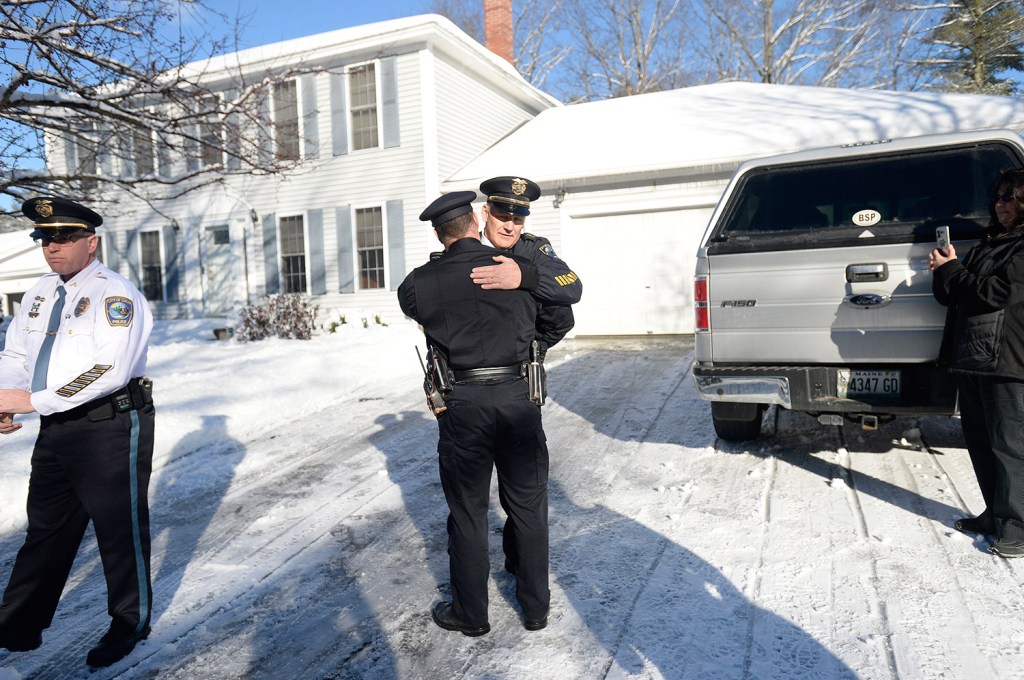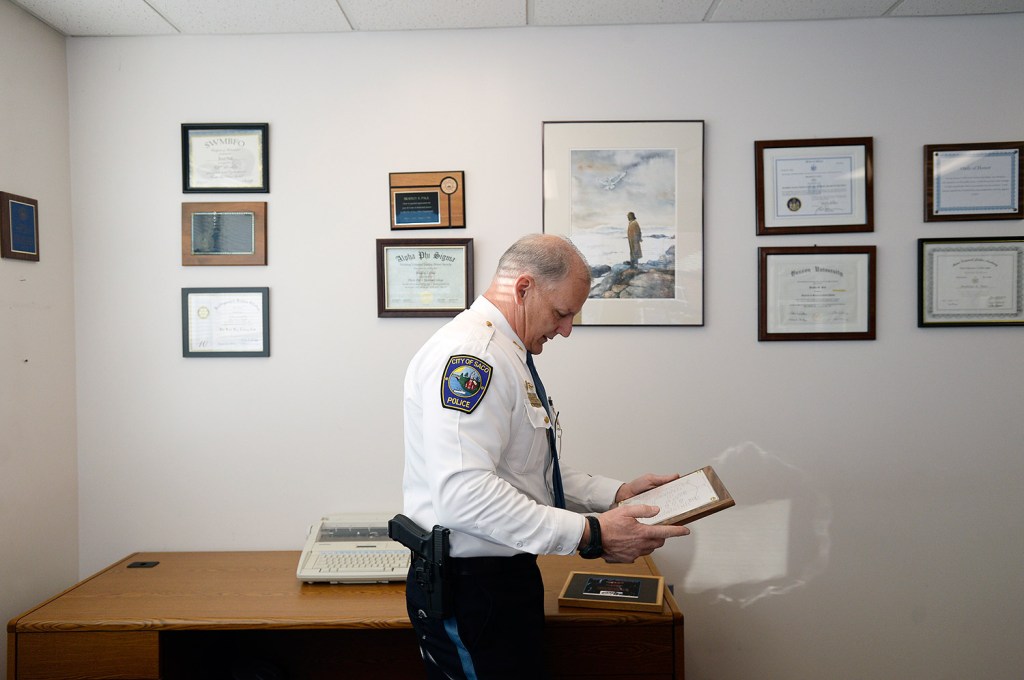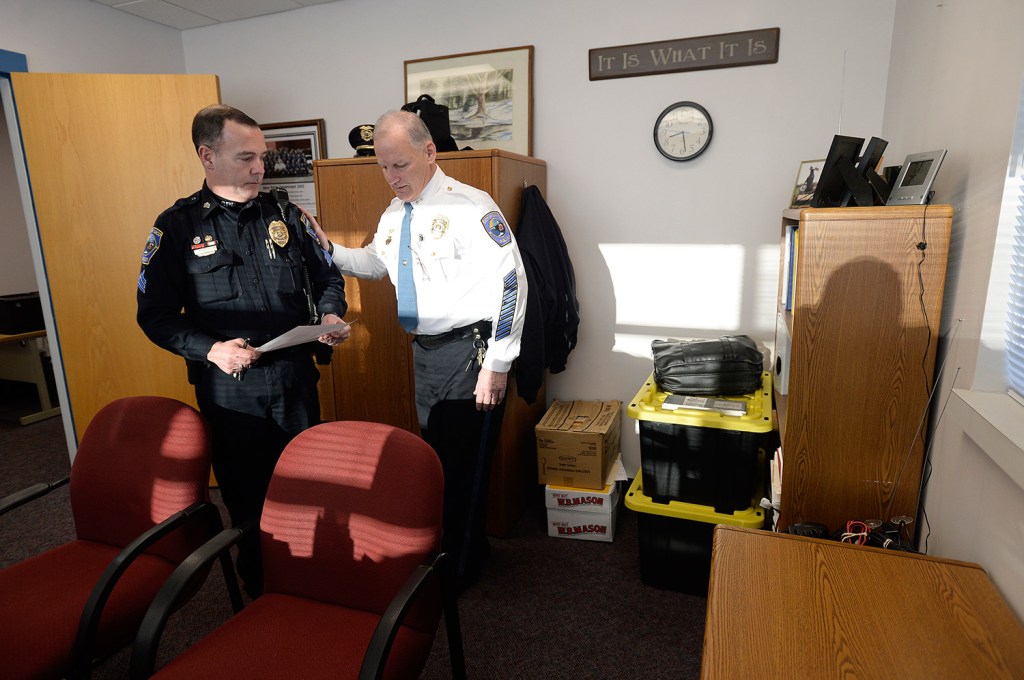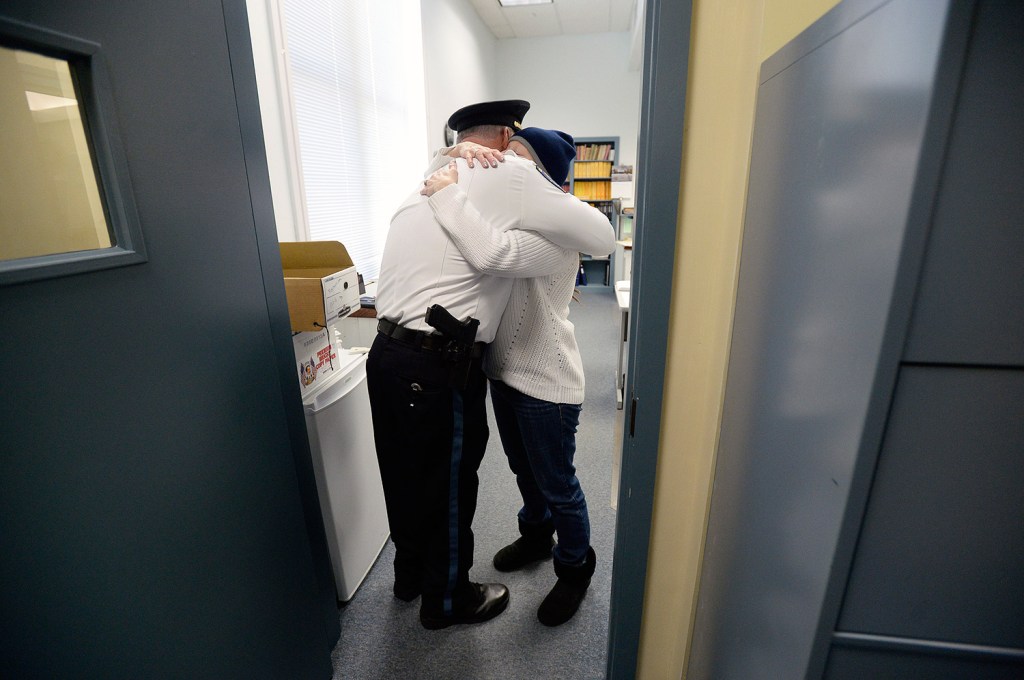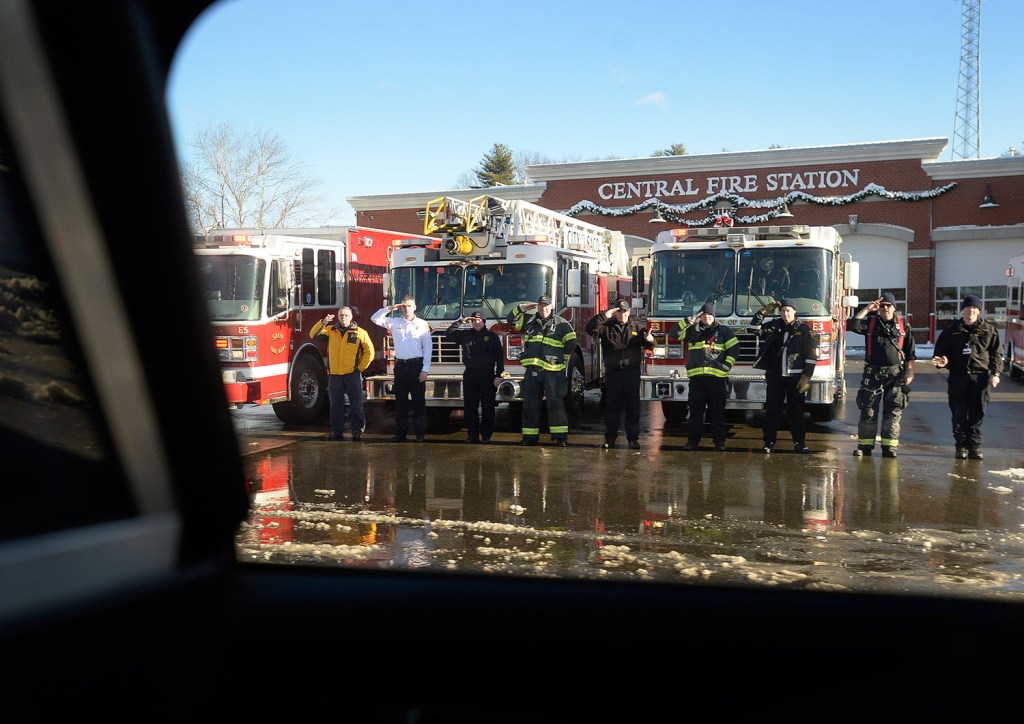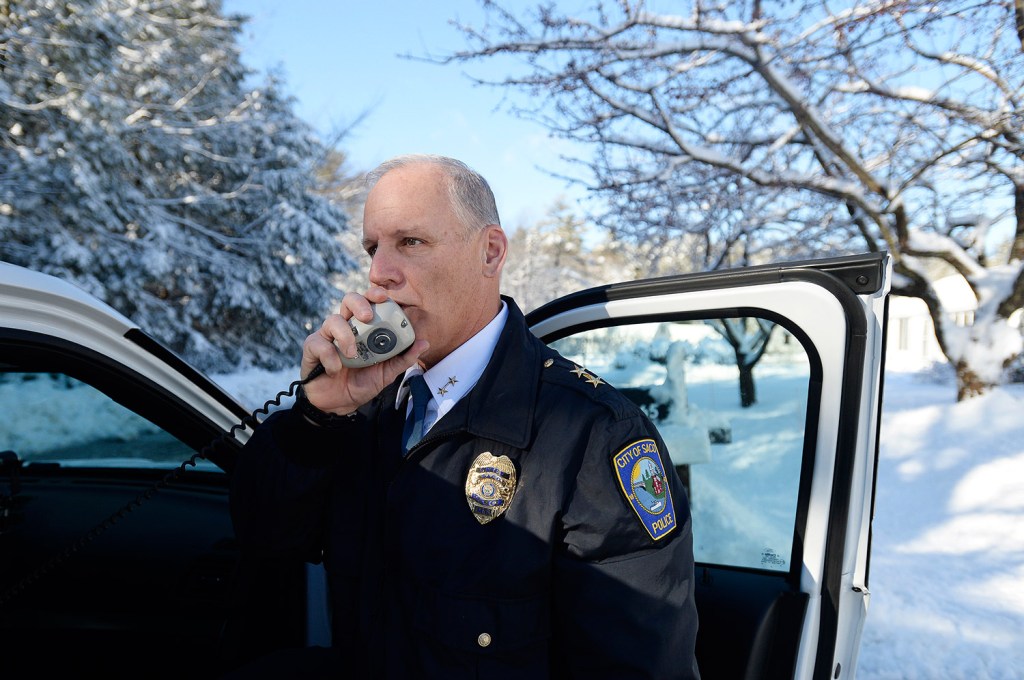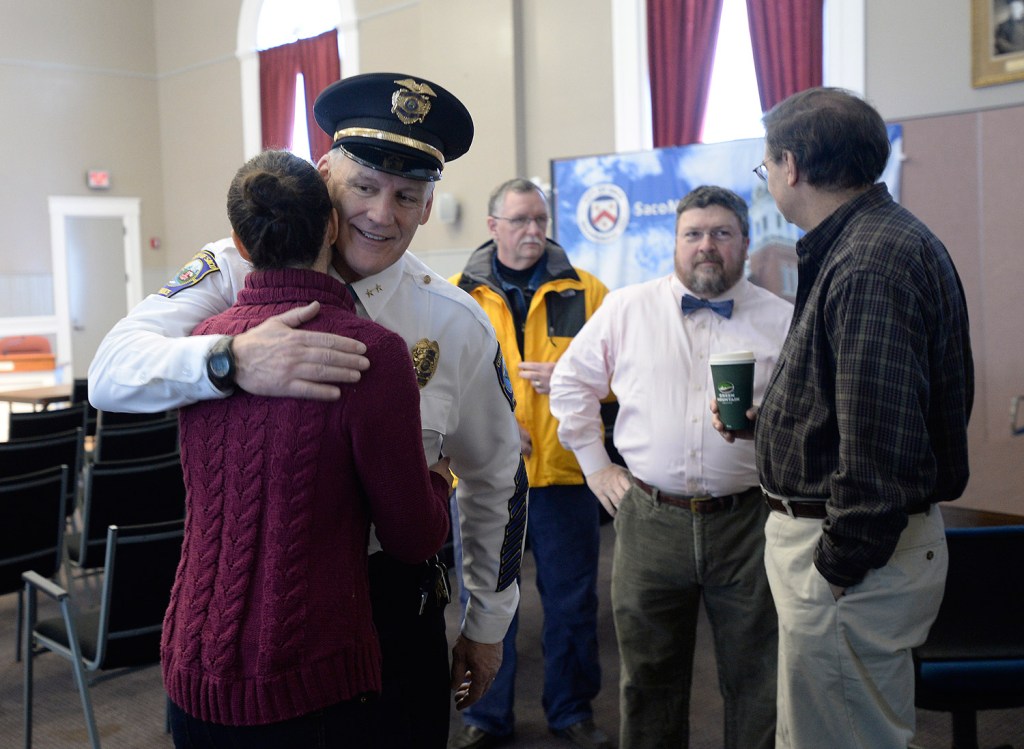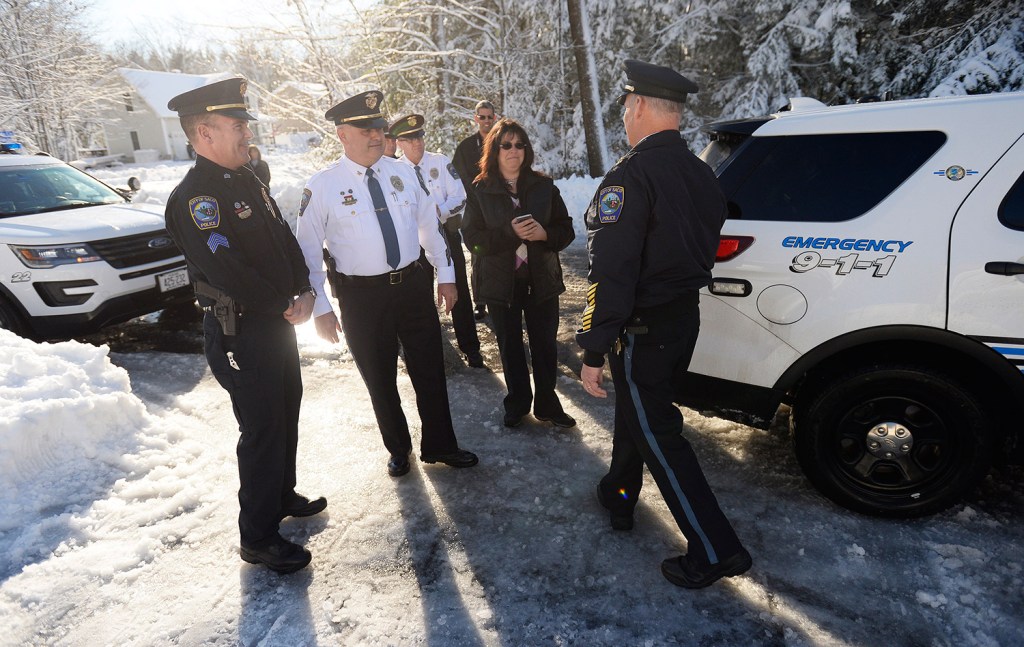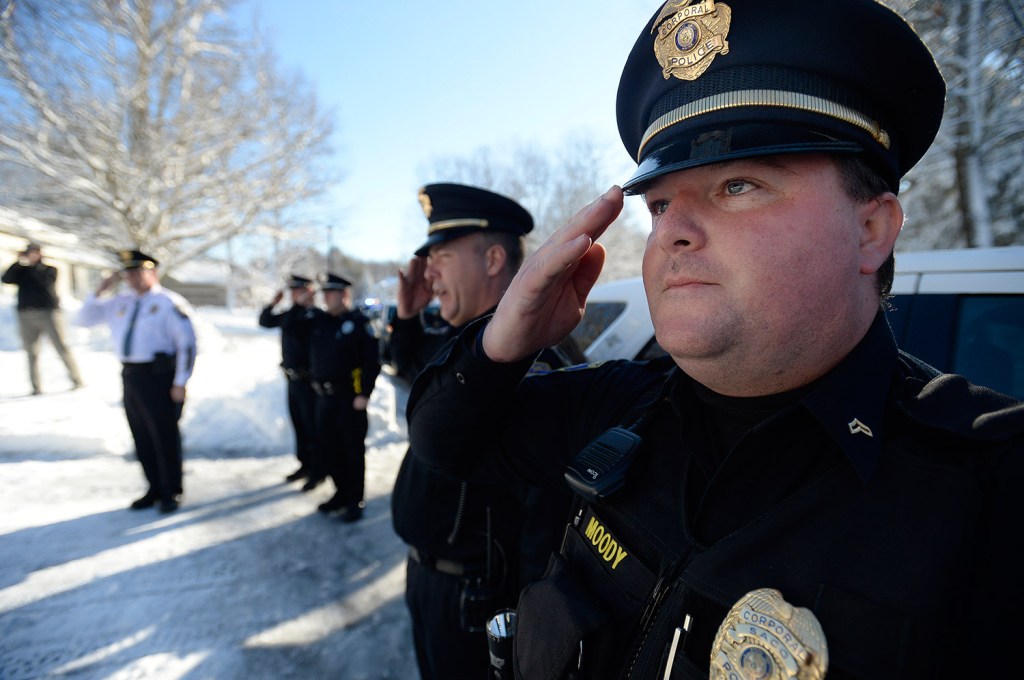Brad Paul already had cleared snow from his driveway and two others when the police cruisers pulled up to his house just after sunrise. The chief – his white shirt crisp, gold badge glinting in the early morning sun – was ready. After 40 years with the Saco Police Department, it was time for his last ride to work. His last walk through City Hall in uniform. His last radio call.
“You think you’re fine, then all of a sudden your emotions are in your throat,” Paul said.
 The chief retired Friday after a long career in which he distinguished himself as a thoughtful, positive leader who gave tirelessly to the community. The privilege, he says, was all his. Paul, 61, feels fortunate to step away after a good career while he still has his health and time to do the things he’s put on the back burner for too long.
The chief retired Friday after a long career in which he distinguished himself as a thoughtful, positive leader who gave tirelessly to the community. The privilege, he says, was all his. Paul, 61, feels fortunate to step away after a good career while he still has his health and time to do the things he’s put on the back burner for too long.
“I didn’t want to turn into that person who someone taps on the shoulder and says ‘Chief, you should probably have left a couple years ago,'” he said.
In his office, he pulled framed photos and commendations off the wall, turned in the last of his gear and dropped a stack of files on the desk of the new chief.
At City Hall, he smiled broadly as Deputy Chief Raynald Demers, who worked alongside Paul for 32 years, was sworn in as the city’s next police chief. He stopped in office after office for goodbye hugs from colleagues. He had one last round of coffee and pastries – with a side of good-natured ribbing – with fellow officers.
Outside, eight cruisers lined up to escort Paul home. Lights flashing blue and sirens blaring, the procession pulled onto Main Street and rolled slowly past City Hall.
“How many runs have we made up this street?” Paul mused. “It must be tens of thousands.”
HE WOULD FOLLOW UNCLE’S LEAD
Paul grew up in Biddeford, one of 10 children in a traditional Catholic family. His father drove a school bus between shifts at the mill. His mother stayed home to care for the family.
“At any given time, there were six Paul kids populating St. Mary’s School,” he said. “I was No. 4 of that brood. The nuns already had you typecast as to what kind of student you were going to be.”
He didn’t dream as a little boy of being a cop, but by the time he finished high school he was thinking about becoming a police officer like the uncle he admired. He dreamed of a job that would be both interesting and adventurous.
After graduating, he joined the Army as a military police officer and was sent to a missile base in North Dakota, a remote place he remembers as boring and cold. But it was there, as he worked alongside 200 other MPs guarding missiles, that he knew for certain he’d stay in law enforcement.
Two years later, Paul was back in Maine, handing resumes to every local department and eager to get to work. He walked through the door of the Kennebunkport Police Department at just the right time. The chief was looking for summer reserve officers and agreed to hire Paul if the young officer paid for his own training school. Halfway through the summer, Paul was offered a job in Saco. He didn’t want to leave Kennebunkport hanging, so he spent the summer working 40 hours each week in Dock Square writing parking tickets and directing traffic, and 40 hours as a Saco dispatcher.
He loved every minute of it.
“You were part of something that was bigger than yourself,” he said. “It could be both exciting and boring in the same day.”
Within months, he became a Saco patrol officer, only to lose his job a short time later because of budget issues. He wouldn’t let himself be discouraged and immediately went to work for Brunswick.
“You don’t look back,” he said. “You look forward.”
HIS WORK LEFT AN IMPRESSION
It wasn’t long before his job in Saco was restored and Paul returned to the city where he would spend his entire career, working his way up through the ranks. Paul and his wife, Laura, raised two daughters in the city. After work, he officiated football games and volunteered with Rotary International.
Paul relished it all: the camaraderie, the lessons he learned from other officers, connecting with the community even during its darkest days.
“There was never a question for me what I wanted to do,” he said.
But there were cases that were hard, that marked him in ways he only understood after he became a police officer and saw people in their most tragic moments. He learned that time heals and talking helps.
“Your cases mark you. They leave an indelible stamp on your soul — they just do,” he said.
In his early days as a patrol officer, Paul found himself at the scene of a car accident that claimed the lives of four people. He lifted the lifeless body of a 4-year-old boy out of the wreckage and laid him across the back seat of his cruiser. He struggled to find pulses on other victims, telling a nurse who stopped to help that he must be doing it wrong.
There were no pulses, she told him.
“That’s when the responsibility of your position washes over you,” he said. “You can’t always make things come out OK.”
Nearly 40 years later, he found himself at the scene of an unimaginable tragedy, the bodies of three children, their mother, and the father who killed them found lying in an apartment only blocks from the police department.
“Every tragedy takes a toll on you. You can’t unsee them,” he said. “But out of that tragedy, you saw healing and comforting in the community that was, frankly, moving.”
NEXT UP: HIKES AND HOGS
On his last ride home, Chief Paul fell quiet as the cruiser rolled down Main Street, slowing for the turn onto North Street. Pedestrians stopped to watch. Drivers pulled over and peered out their windows.
Paul was thinking about a lot of things: the career he loved, the friendships he made, life out of uniform.
Paul, whose smile comes easy and energy seems boundless, doesn’t know what his next step will be. His to-do list is already long. His wife told him he has some house painting to do. He wants to hike Mount Katahdin a second time. He’s finally going to go on a long solo motorcycle trip, looping up over the Great Lakes on his way to that former missile base in North Dakota.
As the cruiser passed the fire station, Paul waved to the firefighters and paramedics who stood in front of their trucks, saluting the chief. In his neighborhood, people stopped shoveling their driveways to wave.
Paul stepped out of his cruiser at the end of his driveway and picked up the radio to call dispatch.
“Be advised, I’ll be 10-7 at my 10-90,” he said, his head bowed. Out of service. At home.
The radio crackled.
“Saco, all units,” a dispatcher said and began to read a message for Paul. “We are grateful and proud of your service and have had the pleasure of serving and learning alongside you throughout the last 40 years. From all of us at the Saco Police Department, Chief, thank you and enjoy your retirement.”
Paul took a few steps up his driveway and turned to look over the dozen officers who stood saluting their chief. He raised his hand and returned the salute, nodding slightly as he cracked a smile.
Send questions/comments to the editors.


